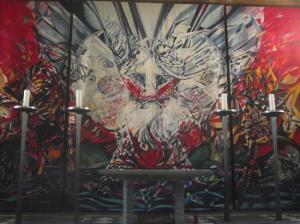Today (3rd October) in the lectionary we commemorate George Bell, an activist in the Church during the World War I, World War II and post-War eras, celebrated for his commitment to the poor, and to peace, and unity.
Born on Hayling Island in England in 1883 and ordained priest at the age of 25 in 1908 after studying at both Oxford and Wells, he worked at first as a curate in the inner city of Leeds serving there the poor and oppressed. He learned much from the Methodists who he worked alongside, whose commitment to social engagement he saw as a challenge and example to the Church of England.
After Leeds, he moved to do further study at Oxford and worked as a tutor and founder of a cooperative for students, and worked for the Workers’ Educational Association (WEA).
1914 to 1918 he worked for the Order of Saint John caring for children orphaned by World War I, and began a life-long friendship with the Swedish Lutheran Archbishop Nathan Soderblom.
After years of pastoral and priestly ministry he worked as Dean of Canterbury Cathedral from 1925 to 1929 where he initiated the Canterbury Festival of the Arts with guest artists such as Dorothy L. Sayers and T.S. Elliot, and was ordained bishop of Chichester in 1929 where he was welcomed by trade unionists for his diocese’s fight against deprivation and the Great Depression.
As the Nazis rose to power in the 1930s in Germany, Bell began organising safe havens in England for Jews, Jewish Christians, and others fleeing fascism, and in 1933 he became friends with the German theologian Dietrich Bonhoeffer, who wrote the modern classic The Cost of Discipleship. Bell and Bonhoeffer were co-signatories in 1934 of the founding document of the Confessing Church, which stated that Nazi political theory and Christian belief were incompatible. Throughout the war Bonhoeffer fought the Nazi’s genocidal regime, and ultimately paid with his life, arrested by the Gestapo in 1944 and hanged at a concentration camp in 1945 just weeks before Hitler committed suicide.
For his part, during the war Bell was a voice of moderation, speaking out as a politician in the House of Lords against indiscriminate bombing of civilians, urging the European churches to be critical of their countries’ ways of waging war, and after the war he interceded in the Cold War and opposed nuclear armament, and these political stances may have cost him the opportunity to become Archbishop of Canterbury when William Temple died in 1946.
His enduring significance, however, comes especially from the time he gave to ecumenical projects, being a founder of the World Council of Churches and a personal friend to Pope Paul VI who convened the ecumenically-minded Second Vatican Council, and is remembered as a scholar, a man of great humility, and a friend of humanity.
Prayers:
Lord, open our lips
And our mouths shall proclaim your praise.
Praise to the holy and undivided Trinity, one God,
As it was in the beginning, is now, and ever shall be,
World without end.
God of peace, you sustained your bishop George Bell with the courage to proclaim your truth and justice in the face of disapproval in his own nation: may we enter your country where there is no sorrow nor sighing, but fullness of joy in you; through Jesus Christ our Redeemer, who with you and the Holy Spirit lives and reigns, one God, in glory everlasting. Amen.
Glory to God whose power, working in us can do infinitely more than we can ask or imagine: Glory to him from generation to generation in the Church, and in Christ Jesus for ever and ever. Amen.++


